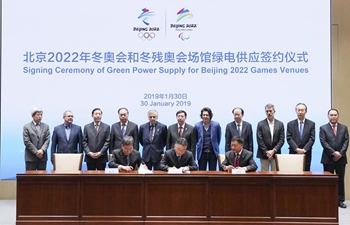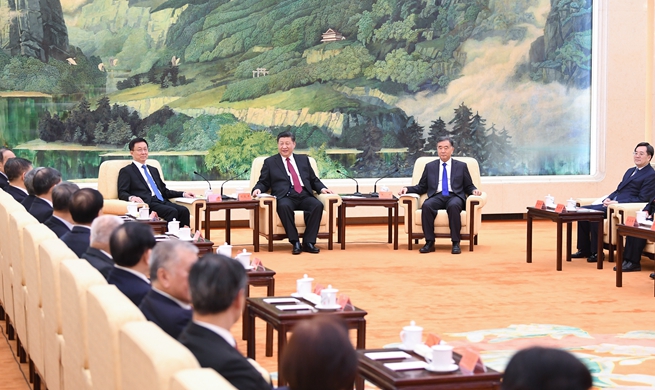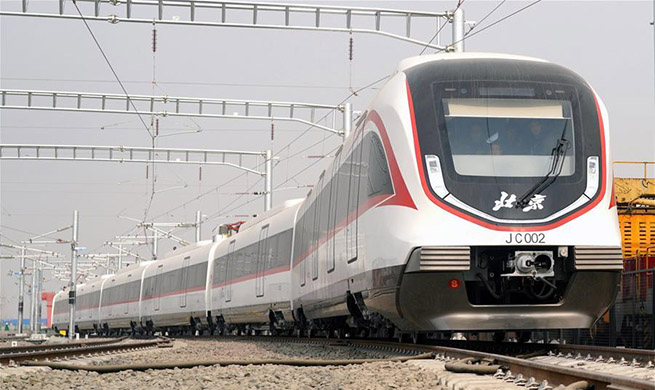MADRID, Jan. 30 (Xinhua) -- Spanish experts expressed confidence in Chinese telecommunications giant Huawei, saying it should be treated just like other companies from anywhere in the world.
During a recent interview with Xinhua, Enrique Puertas, a Spanish expert in artificial intelligence and cybersecurity at the Universidad Europea de Madrid, said that "Huawei cannot be a problem: we are talking about a key company with a long trajectory working with telecommunications companies which use its hardware in Spain."
"We should treat Huawei the same as an American or French company ... or one from anywhere else in the world," he added.
Speaking to the online newspaper "Vozpopuli.com," David Sancho, who is responsible for research at the specialized publication Trend Micro, said Huawei "does things like everyone else" and their products "have no clear advantage or disadvantage" in respect to other products.
"They are phones with Android software and so they are more open than others, such as Apple, for example," Sancho said.
Jose Manuel Riera, professor at the School of Telecommunications at the prestigious Universidad Politecnica de Madrid, also ruled out any kind of illicit practices based on his working experience.
"I work in a public institution and we have had a relationship with Huawei for over five years. We have always had excellent treatment from the company and have full confidence in them. According to my experience, there is no reason for us to be afraid of anything," said Riera.
Riera was responding to a remark from Andrus Ansip, the vice president of the European Commission for the Digital Single Market, who said that Europe should be "afraid" of companies such as Huawei.
During the interview, Puertas also highlighted that Huawei is not merely a smartphone manufacturer.
"The image we have of Huawei in Spain is related to their mobile phones, but it is a company which provides technology for routers or the networks that are used for landlines. However, people also see that Huawei's models are the first with features such as artificial intelligence and I believe the company has a very positive image," he told Xinhua.
Maintaining a close relationship with the country's National Institute of Cybersecurity (INCIBE), Huawei has jointly developed projects with them.
"It is a good way of raising awareness so people can participate in challenges with two great institutions such as these," said Puertas.
Enrique Dans, professor for information systems at the Instituto de Empresa (IE), shared Puertas' thoughts about Huawei's role in cybersecurity and highlighted that the company "carries out a lot of projects" in this field.
However, Huawei's work in Spain is also to help with the rollout of 5G networks.
"It is orientated to show that this new technology can change our lives as we understand them today," said Riera, whose university only recently inaugurated Spain's first professorship in 5G in collaboration with Huawei.
"Huawei is helping with the students' end of course projects by offering technology and visits to their offices among other things. The director of Huawei's Human Resources Department has also come to speak to students and to give conferences," Riera added.
Huawei currently employs around 1,000 people in Spain and aims to continue to create more jobs within the country.
"This kind of young talent is very much in demand these days, but Huawei has worked well to try and attract these talented young people," said Puertas.
Huawei published another communique Tuesday, in which it expressed "disappointment" at charges leveled against it.
"The company denies that it or its subsidiary or affiliate have committed any of the asserted violations," the statement said.
Dans said that there are other reasons for the recent criticism against the Chinese company.
"Until I see documents which prove that Huawei are spying on us or that we can't trust them, I don't believe it. All I see is a commercial war. From the EU (European Union) point of view, everything moves around commercial alliances," Dans said.













